Vous vous sentez souvent submergé par vos émotions, épuisé par les stimuli ou en décalage avec les autres ?
L’hypersensibilité, loin d’être une faiblesse, peut devenir une véritable force si vous apprenez à la comprendre, à la gérer et à en tirer parti.
En tant que spécialiste du HPI et de l’hypersensibilité, j’ai accompagné des centaines de personnes à transformer leur sensibilité en atout. Je vais vous guider pour mieux vivre avec votre hypersensibilité et retrouver un équilibre apaisant dans votre quotidien.
ℹ️ L’hypersensibilité : c’est quoi ?
Commençons par définir ce qu’est une personne hypersensible.
Définition de l’hypersensibilité
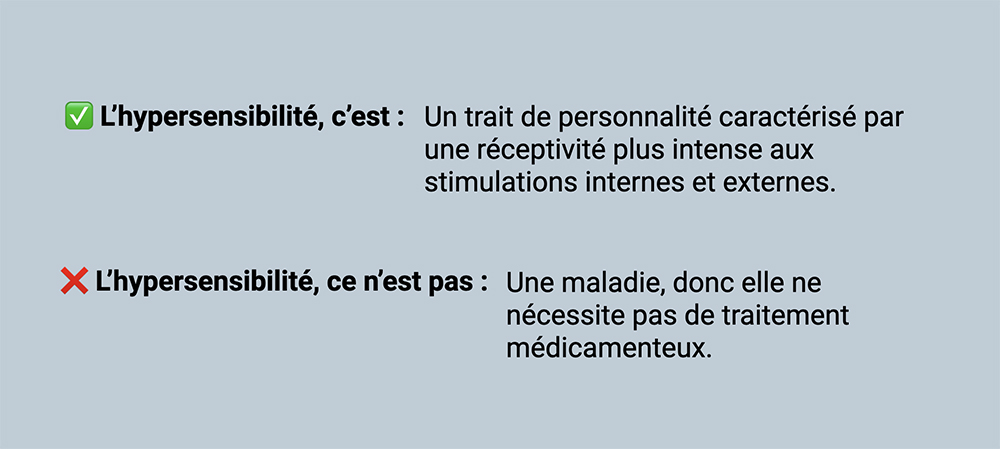
L’hypersensibilité désigne un trait de personnalité caractérisé par une réceptivité plus intense aux stimulations internes et externes. Elle se manifeste par des réactions émotionnelles ou sensorielles amplifiées, rendant le quotidien parfois difficile à gérer.
Contrairement à ce que l’on pourrait croire, l’hypersensibilité n’est ni une maladie ni un trouble psychologique. C’est une manière de fonctionner qui, bien comprise, peut devenir une véritable force.
On estime que l’hypersensibilité touche 20% de la population mondiale.
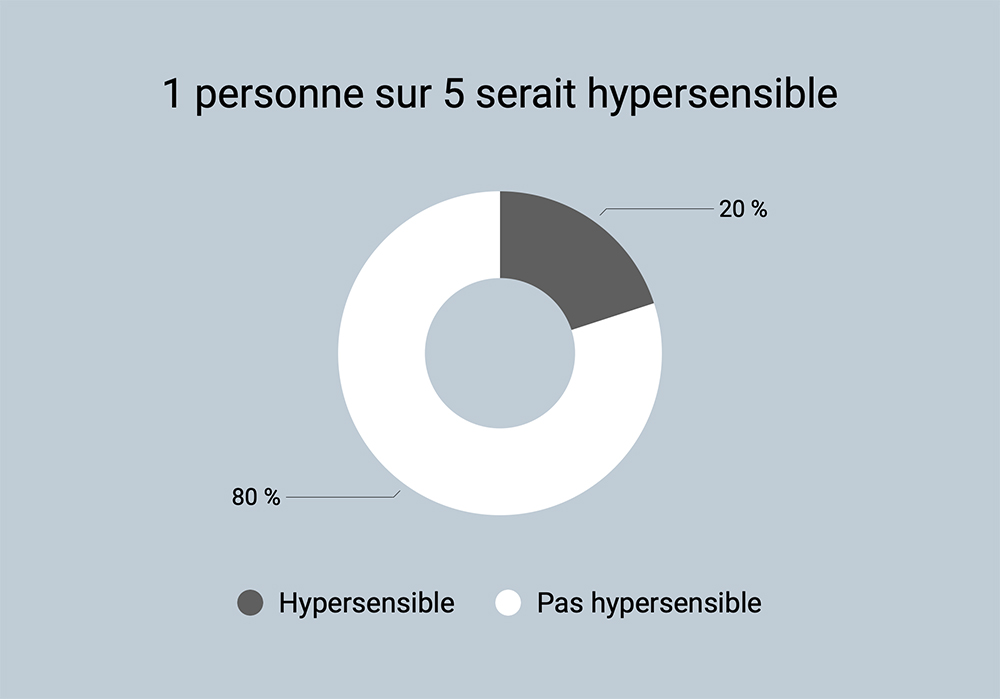
Les formes d’hypersensibilité
Il existe deux formes principales d’hypersensibilité : l’émotionnelle et la sensorielle.
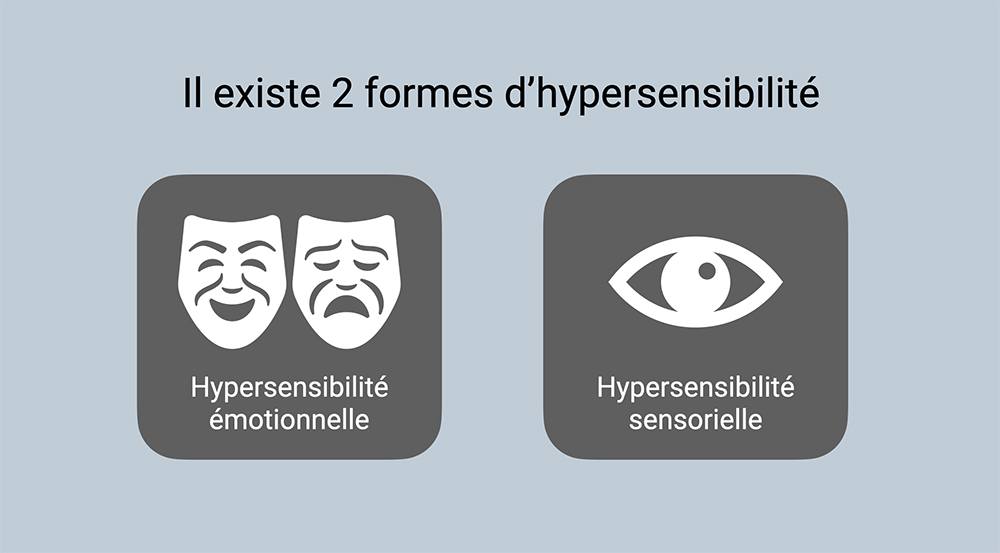
- L’hypersensibilité émotionnelle concerne une perception accrue des émotions, tant les siennes que celles des autres. Cela se traduit souvent par des réactions vives à des événements perçus comme anodins par la majorité ;
- L’hypersensibilité sensorielle se manifeste par une réactivité accrue aux stimuli physiques tels que le bruit, la lumière, ou les textures, rendant certains environnements difficiles à supporter. On parle d’hyperesthésie.
Parmi les variations de ce trait, on distingue l’hypersensibilité « classique » et l’hypersensibilité « empathique ».
- L’hypersensibilité classique se concentre sur la sensibilité accrue aux stimuli, provoquant une surcharge émotionnelle et une tendance à l’isolement pour éviter le malaise.
- L’hypersensibilité empathique, quant à elle, implique une capacité à ressentir intensément les émotions des autres, au point de parfois perdre la distinction entre ses propres ressentis et ceux d’autrui. Ce type d’hypersensibilité est souvent observé chez les personnes fortement empathiques, qui captent intuitivement l’état émotionnel des autres sans filtre protecteur.
L’hypersensibilité peut parfois être confondue avec d’autres traits, tels que le Haut Potentiel Émotionnel (HPE) ou les Hauts Potentiels Intellectuels (HPI).
- Les personnes HPE partagent des similitudes avec les hypersensibles, notamment dans la richesse de leur vie émotionnelle, mais se distinguent par leur capacité à traiter rapidement des informations complexes liées aux émotions. Ils ont de l’intelligence émotionnelle.
- Les HPI, quant à eux, présentent une grande capacité intellectuelle, associée à une sensibilité accrue qui peut influencer leur manière de percevoir le monde.
Les causes de l’hypersensibilité
Les origines de l’hypersensibilité sont variées et incluent des facteurs génétiques, environnementaux et psychologiques.
Je parlais des causes de l’hypersensibilité dans ma vidéo sur le cerveau hypersensible :
🥼 Quels sont les symptômes de l’hypersensibilité ?
L’hypersensibilité se manifeste par une intensité émotionnelle et une réactivité sensorielle accrues.
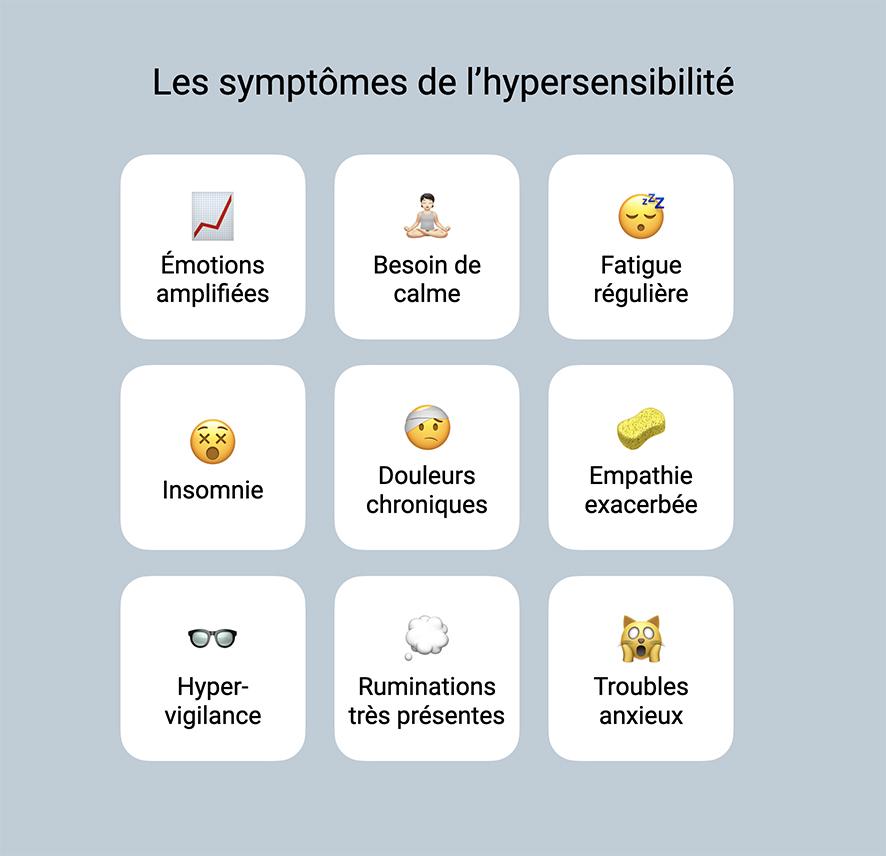
Signes principaux de l’hypersensibilité
Voici les caractéristiques de l’hypersensibilité :
- Vous ressentez probablement des émotions de manière amplifiée, un phénomène appelé hyperesthésie émotionnelle. Un simple film triste ou une remarque anodine peuvent déclencher des réactions profondes.
- Les stimuli sensoriels, comme une lumière vive, des bruits soudains ou des odeurs fortes, peuvent également vous submerger, vous obligeant à rechercher des environnements plus calmes. L’hypersensible a besoin de temps seul.
- Les manifestations physiques de l’hypersensibilité sont fréquentes. Vous pouvez ressentir une fatigue intense même après une journée ordinaire, car votre système nerveux travaille constamment pour gérer les informations perçues.
- L’insomnie est courante chez les hypersensibles, car votre esprit a du mal à se déconnecter et à se détendre.
- Les douleurs chroniques, comme des maux de tête ou des tensions musculaires, peuvent aussi accompagner cette sensibilité exacerbée.
Signes comportementaux
Sur le plan comportemental, vous pourriez observer :
- Une empathie exacerbée, une véritable capacité à capter les émotions des autres, parfois au détriment de votre propre bien-être. Cette empathie, bien que précieuse, vous rend souvent vulnérable au stress émotionnel.
- L’hypervigilance est un autre signe courant : vous restez constamment sur le qui-vive, à l’affût de la moindre variation dans votre environnement.
- La rumination, cette tendance à ressasser des pensées négatives, peut également vous empêcher de trouver la paix intérieure.
Troubles associés
Les hypersensibles sont plus enclins à développer des troubles associés, tels que l’anxiété, la dépression, ou des comportements compulsifs comme les troubles alimentaires.
Par exemple, il m’arrive souvent de ressentir une anxiété diffuse après une conversation animée, comme si les émotions présentes m’avaient littéralement envahi.
📋 Où faire un test d’hypersensibilité ?
Si vous souhaitez vérifier si vous êtes hypersensible, un test d’hypersensibilité réalisé par un spécialiste peut vous apporter des réponses claires.
Connect The Dots propose le Test HyperFeel, un outil unique pour détecter l’hypersensibilité.
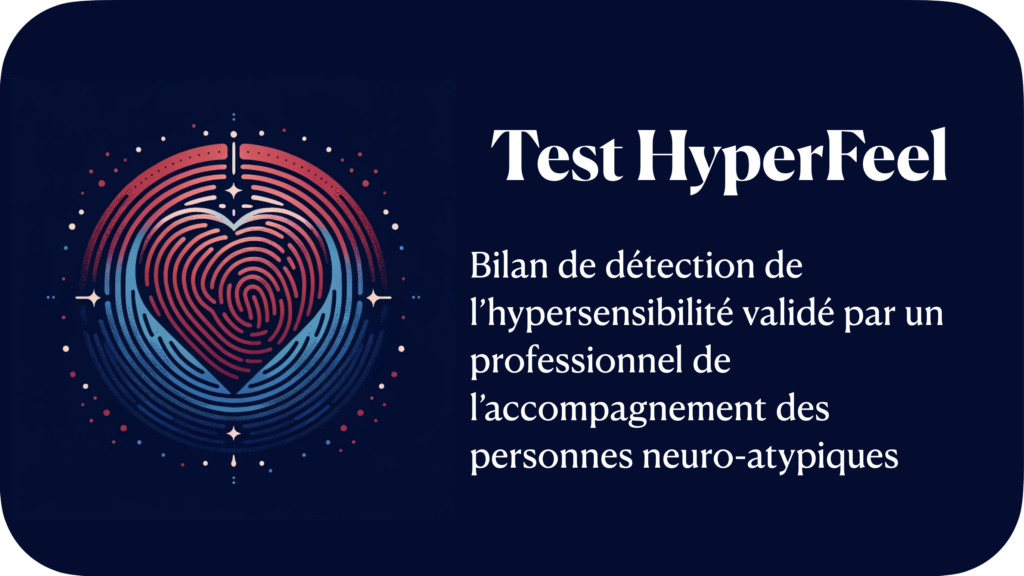
Les points positifs de ce test par rapport aux autres :
- Il explore les différentes facettes de la sensibilité émotionnelle et sensorielle, vous offrant une compréhension globale de votre fonctionnement.
- Ne se contente pas de poser des questions standardisées. Il inclut des mises en situation concrètes qui analysent comment vous réagissez dans la vie de tous les jours. Le processus évalue également l’évolution de votre hypersensibilité depuis votre enfance jusqu’à l’âge adulte. Chaque réponse est minutieusement étudiée par Paul Dugué, garantissant une analyse personnalisée et détaillée.
- Vous recevez un retour complet comprenant un score global et des recommandations spécifiques à votre profil.
- En plus du score, le test vous fournit un guide PDF pour mieux vivre avec votre hypersensibilité et, si les résultats le confirment, un certificat officiel attestant de votre profil hypersensible.
Ce bilan approfondi peut être un premier pas vers une meilleure compréhension de vous-même.
☀️ Comment vivre avec une hypersensibilité ?
Vivre avec l’hypersensibilité peut sembler difficile, mais il est possible de transformer cette particularité en atout.
Faire de l’hypersensibilité une force
La première étape consiste à s’accepter tel que l’on est. Reconnaître vos points forts, comme votre empathie et votre créativité, vous permet de valoriser cette sensibilité plutôt que de la percevoir comme une faiblesse. Vos qualités uniques peuvent enrichir vos relations et booster votre potentiel créatif.
Pour gérer les moments d’hyperstimulation, il est essentiel de créer un environnement apaisant.
- Privilégiez des espaces calmes et réduisez les sources de stimuli qui vous fatiguent, comme le bruit ou la lumière forte.
- N’hésitez pas à vous isoler temporairement pour vous ressourcer. Par exemple, j’ai l’habitude de m’octroyer des pauses en silence après une journée chargée. Quelques minutes seul dans une pièce sombre m’aident à retrouver mon calme et à me recentrer. Le repos d’un hypersensible est très important.
Techniques de gestion émotionnelle et sensorielle
Adopter des techniques de gestion émotionnelle et sensorielle peut aussi vous aider.
- La relaxation, la respiration profonde et la méditation de pleine conscience sont des pratiques efficaces pour apaiser votre système nerveux. Elles vous permettent de mieux gérer les émotions intenses en les observant sans les juger. C’est ce que l’on appelle la régulation émotionnelle.
- La thérapie cognitive et comportementale (TCC) et la thérapie interpersonnelle (TIP) peuvent également être très bénéfiques. Elles offrent des outils concrets pour réguler vos pensées automatiques et améliorer vos interactions avec les autres.
Se protéger des surcharges émotionnelles
Protéger votre équilibre émotionnel passe par l’apprentissage de limites claires dans vos relations.
Apprenez à dire non sans culpabiliser, à vous retirer lorsque vous vous sentez submergé(e). Pour moi, poser des limites a été une révélation : j’ai appris à ne plus me sentir obligé de tout absorber des autres, me protégeant ainsi de l’épuisement émotionnel.
Pour éviter la surcharge, il est crucial de gérer votre temps avec soin.
- Planifiez des moments de pause dans votre journée et veillez à ne pas surcharger votre agenda.
- Reconnectez-vous régulièrement à vous-même, en pratiquant des activités qui vous apaisent, comme la lecture, l’écriture ou simplement une promenade en pleine nature. Ces moments de reconnexion sont essentiels pour recharger vos batteries et maintenir un état d’esprit équilibré.
✅ Conclusion : c’est quoi être hypersensible ?
L’hypersensibilité, loin d’être un obstacle, peut devenir une véritable force lorsqu’on apprend à la reconnaître, à la gérer et à la valoriser. Comprendre vos réactions et accepter vos particularités vous permet de mieux vivre avec cette sensibilité unique.
En adoptant des stratégies adaptées, comme l’isolement temporaire, la gestion des émotions par la pleine conscience ou l’établissement de limites, vous transformez ce trait en un atout précieux.
Plutôt que de considérer l’hypersensibilité comme une faiblesse, voyez-la comme une richesse qui vous connecte plus profondément au monde et aux autres. Votre capacité à ressentir intensément est une qualité rare. Il est tout à fait possible d’être hypersensible et heureux.
Pour moi, accepter ma propre sensibilité m’a permis de développer une meilleure compréhension de moi-même et des autres. En vous écoutant et en valorisant ce que vous êtes, vous pouvez faire de votre hypersensibilité une source de fierté et d’épanouissement.
❓ FAQ – haute sensibilité
Puis-je devenir moins sensible avec le temps ?
Il est possible de mieux gérer votre hypersensibilité en adoptant des stratégies adaptées. La thérapie cognitive et comportementale (TCC) ou la pleine conscience vous aide à apprivoiser vos réactions. Vous ne changerez pas votre sensibilité de fond, mais vous apprendrez à mieux vivre avec. Certains hypersensibles rapportent qu’avec l’âge et l’expérience, ils se sentent plus équilibrés et moins submergés par leurs émotions. C’est un processus d’acceptation et de gestion qui vous permet de vous adapter et de tirer le meilleur parti de votre sensibilité.
Est-ce que l’hypersensibilité est liée à d’autres troubles ?
L’hypersensibilité peut être associée à des troubles comme l’anxiété ou la dépression, sans pour autant en être la cause directe. Les personnes hypersensibles ressentent souvent les émotions de manière plus intense, ce qui peut les rendre vulnérables aux troubles de l’humeur ou aux compulsions. Cependant, il est important de différencier votre hypersensibilité de ces états pour mieux cibler le soutien adapté. Consulter un professionnel comme un psychologue ou un thérapeute peut vous aider à faire la part des choses et à trouver des solutions adaptées à votre situation.
Peut-on traiter l’hypersensibilité avec des médicaments ?
L’hypersensibilité n’est pas une pathologie, donc elle ne nécessite pas de traitement médicamenteux spécifique. Toutefois, si elle s’accompagne d’autres problématiques comme l’anxiété ou la dépression, un professionnel de santé pourrait recommander un traitement temporaire pour ces conditions. La gestion de l’hypersensibilité repose surtout sur des stratégies comportementales, des techniques de relaxation, et un environnement adapté à vos besoins. Consulter un spécialiste, comme Paul Dugué de Connect The Dots, peut également vous guider dans cette démarche et vous proposer des conseils personnalisés.
Comment expliquer mon hypersensibilité à mon entourage ?
Expliquez à vos proches que votre hypersensibilité n’est pas un choix, mais un mode de fonctionnement. Insistez sur le fait que vous ressentez les choses de manière plus intense, ce qui peut vous affecter différemment des autres. Partager vos besoins, comme avoir des moments de calme, peut aider vos proches à mieux vous comprendre et à ajuster leurs comportements. Utiliser des exemples concrets de votre quotidien leur permettra de se projeter plus facilement dans votre réalité et de réaliser que cette sensibilité peut aussi être une qualité.
L’hypersensibilité peut-elle nuire à ma vie professionnelle ?
L’hypersensibilité peut représenter un défi au travail, notamment face à des environnements bruyants, stressants, ou peu empathiques. Cependant, elle peut aussi devenir un atout si vous apprenez à en tirer parti. Votre sensibilité peut vous rendre particulièrement attentif aux détails, créatif, ou excellent dans les métiers relationnels. Adaptez votre environnement de travail autant que possible : portez des écouteurs anti-bruit, aménagez un espace calme, et imposez-vous des pauses régulières. Votre sensibilité, bien gérée, peut vous distinguer et apporter une valeur unique dans votre carrière professionnelle.
